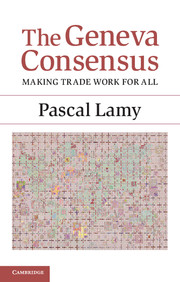Book contents
- Frontmatter
- Contents
- Preface
- 1 Harnessing globalization amid the crisis facing multilateralism
- 2 The changing face of trade
- 3 Helping the poorest up the prosperity ladder
- 4 Trade: friend not foe of the environment
- 5 Trading towards global food security
- 6 Trade can contribute towards better health
- 7 Trade and labour: separated at birth, but still connected
- 8 Trade and energy: the case for a greater WTO role
- 9 Trade and currencies: trading community seeks greater currency stability
- 10 Trade and competition: fairer competition makes for fairer trade
- 11 Trade and human rights: a case of misplaced suspicion
- 12 Corruption: a cancer that trade transparency can help to treat
- 13 Last but not least: the Doha Round
- Epilogue
- Index
11 - Trade and human rights: a case of misplaced suspicion
Published online by Cambridge University Press: 18 December 2013
- Frontmatter
- Contents
- Preface
- 1 Harnessing globalization amid the crisis facing multilateralism
- 2 The changing face of trade
- 3 Helping the poorest up the prosperity ladder
- 4 Trade: friend not foe of the environment
- 5 Trading towards global food security
- 6 Trade can contribute towards better health
- 7 Trade and labour: separated at birth, but still connected
- 8 Trade and energy: the case for a greater WTO role
- 9 Trade and currencies: trading community seeks greater currency stability
- 10 Trade and competition: fairer competition makes for fairer trade
- 11 Trade and human rights: a case of misplaced suspicion
- 12 Corruption: a cancer that trade transparency can help to treat
- 13 Last but not least: the Doha Round
- Epilogue
- Index
Summary
One of my most daunting moments as WTO Director-General was the day I received a doctor honoris causa from the University of Geneva in 2009 in the company of South Africa’s Archbishop Desmond Tutu and former UN Human Rights Commissioner Mary Robinson. Not only was I sharing a distinction with a Nobel Peace Prize laureate and one of the people I most admire, I also had to deliver a speech on the place of human rights in a globalizing world. Globalization and human rights; they are for many a case of chalk and cheese! Hadn’t the Peace Prize laureate himself been critical of many aspects of globalization? So it was with some trepidation that I put forward my ideas on the issues, and particularly the issues surrounding human rights and trade, which is the part of globalization that – obviously – most closely concerns the WTO.
Trade and human rights might indeed seem an unusual association of concepts. After all, in the eyes of many, trade is a villain, a symbol of neoliberalism, mercantilism and capitalism; it is the tool through which powerful multinational corporations impose their writ over human beings, impairing social, economic and cultural rights. The history of the relationship between trade and human rights is a history of suspicion and to some extent of deliberate reciprocal ignorance. The WTO has been depicted as a leading instrument of a globalization in which the market takes precedence over individuals and might over right. It was not so long ago that its ministerial meetings drew large, often violent, demonstrations of protest from anti-globalization groups.
Information
- Type
- Chapter
- Information
- The Geneva ConsensusMaking Trade Work for All, pp. 146 - 155Publisher: Cambridge University PressPrint publication year: 2013
